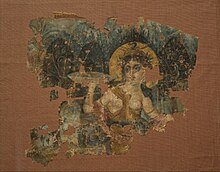Euthenia
Euthenia (/juːˈθiːniə/;[1] Greek: Ευσθένεια, Eustheneia) was the ancient Greek female spirit of prosperity. The Goddess contrasting her is Penia[2] of poverty. Her sisters entailed Eucleia, Eupheme, and Philophrosyne. Along with her siblings, she was regarded as a member of the younger Charites.[3] According to the Orphic fragments, her parents were Hephaestus and Aglaea.[4]

Cultural Significance
[edit]As a symbol of prosperity and wealth she has been depicted across culture, often on coins and venerated through ritualistic practices.
Rome
[edit]On Roman coins, Euthenia is often compared to Abundantia, the personification of abundance and prosperity, and Annona, the personification of the grain supply to Rome.[5]
Egypt
[edit]She is also a part of the Egyptian pantheon, though was later assimilated to tales related to Goddess Isis. During Ptolemaic times, she became the consort of Nilus.[6] Her first appearance on Egyptian coins date back to the last decade of BC.[7]
References
[edit]- ^ "Eu Beauty!". British Baby Names.
- ^ "PENIA - Greek Goddess or Spirit of Poverty". www.theoi.com. Retrieved 2024-10-16.
- ^ Atsma, Aaron J. (2017). "EUKLEIA". Theoi Project.
- ^ Orphic fr. 182 Kern, p. 213 (English translation).
- ^ "Euthenia and Demeter - Elagabalus". sites.google.com. Retrieved 2020-04-07.
- ^ "Curtis Chapter I". www.coinsofromanegypt.org. Retrieved 2020-04-07.
- ^ Kákosy, László (1982). "The Nile, Euthenia, and the Nymphs". The Journal of Egyptian Archaeology. 68: 290–298. doi:10.2307/3821647. ISSN 0307-5133. JSTOR 3821647.
- Kern, Otto, Orphicorum Fragmenta, Berlin, 1922. Scans at the Internet Archive, English translation at HellenicGods.org.
